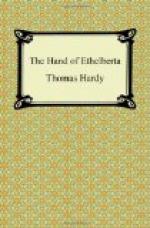‘It is one way; but the nearest is in this direction,’ said the tourist—the same who had been criticized by the two old men.
At hearing him speak all the delicate activities in the young lady’s person stood still: she stopped like a clock. When she could again fence with the perception which had caused all this, she breathed.
‘Mr. Julian!’ she exclaimed. The words were uttered in a way which would have told anybody in a moment that here lay something connected with the light of other days.
’Ah, Mrs. Petherwin!—Yes, I am Mr. Julian—though that can matter very little, I should think, after all these years, and what has passed.’
No remark was returned to this rugged reply, and he continued unconcernedly, ‘Shall I put you in the path—it is just here?’
‘If you please.’
‘Come with me, then.’
She walked in silence at his heels, not a word passing between them all the way: the only noises which came from the two were the brushing of her dress and his gaiters against the heather, or the smart rap of a stray flint against his boot.
They had now reached a little knoll, and he turned abruptly: ’That is Anglebury—just where you see those lights. The path down there is the one you must follow; it leads round the hill yonder and directly into the town.’
‘Thank you,’ she murmured, and found that he had never removed his eyes from her since speaking, keeping them fixed with mathematical exactness upon one point in her face. She moved a little to go on her way; he moved a little less—to go on his.
‘Good-night,’ said Mr. Julian.
The moment, upon the very face of it, was critical; and yet it was one of those which have to wait for a future before they acquire a definite character as good or bad.
Thus much would have been obvious to any outsider; it may have been doubly so to Ethelberta, for she gave back more than she had got, replying, ‘Good-bye—if you are going to say no more.’
Then in struck Mr. Julian: ’What can I say? You are nothing to me. . . . I could forgive a woman doing anything for spite, except marrying for spite.’
’The connection of that with our present meeting does not appear, unless it refers to what you have done. It does not refer to me.’
‘I am not married: you are.’
She did not contradict him, as she might have done. ‘Christopher,’ she said at last, ’this is how it is: you knew too much of me to respect me, and too little to pity me. A half knowledge of another’s life mostly does injustice to the life half known.’
’Then since circumstances forbid my knowing you more, I must do my best to know you less, and elevate my opinion of your nature by forgetting what it consists in,’ he said in a voice from which all feeling was polished away.
’If I did not know that bitterness had more to do with those words than judgment, I—should be—bitter too! You never knew half about me; you only knew me as a governess; you little think what my beginnings were.’




